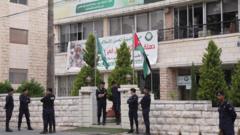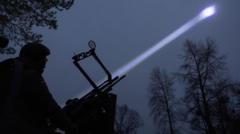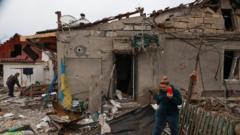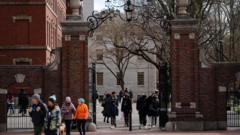Jordan's Interior Minister, Mazen al-Faraya, announced on Wednesday a sweeping ban on the Muslim Brotherhood, following allegations of planned terrorist activities linked to its members. This decision involves not only the closure of all Brotherhood offices but also the confiscation of its assets, thereby rendering any of its activities illegal in the kingdom.
Jordan Takes Drastic Action Against Muslim Brotherhood Amid Alleged Attack Plans

Jordan Takes Drastic Action Against Muslim Brotherhood Amid Alleged Attack Plans
Jordan's government escalates measures against the Muslim Brotherhood, citing security threats from alleged attack plots.
The ban comes in the wake of recent arrests made by the General Intelligence Department, which apprehended 16 individuals suspected of plotting attacks that allegedly aimed to destabilize national security. The accusations included sophisticated plans involving explosives, automatic weapons, and the manufacture of drones and rockets. Al-Faraya indicated that the Brotherhood has operated covertly, posing a potential threat to Jordan's stability.
Despite these claims, the Brotherhood denied its involvement in any terrorist activities, asserting its commitment to peaceful political processes through its political arm, the Islamic Action Front (IAF), which continues to navigate its role in parliament. This crackdown on the Brotherhood follows a previous court ruling deeming the group "dissolved" due to unresolved legal issues. Nevertheless, the IAF remained active and participated in the last parliamentary elections, where it secured a significant number of seats.
While authorities allege that Brotherhood members attempted to destroy evidence of their activities during police raids on their offices, the IAF's secretary general reiterated the party's dedication to legality and order. Founded nearly a century ago in Egypt, the Brotherhood has been deemed a threat in several Arab nations, including Egypt, where it is officially banned, leading to heightened scrutiny and countermeasures across the region.
Jordan's decisive actions reflect growing concerns about internal security and the broader implications of the Brotherhood's activities in a landscape where political Islam continues to stir controversy and provoke responses from state authorities.
Despite these claims, the Brotherhood denied its involvement in any terrorist activities, asserting its commitment to peaceful political processes through its political arm, the Islamic Action Front (IAF), which continues to navigate its role in parliament. This crackdown on the Brotherhood follows a previous court ruling deeming the group "dissolved" due to unresolved legal issues. Nevertheless, the IAF remained active and participated in the last parliamentary elections, where it secured a significant number of seats.
While authorities allege that Brotherhood members attempted to destroy evidence of their activities during police raids on their offices, the IAF's secretary general reiterated the party's dedication to legality and order. Founded nearly a century ago in Egypt, the Brotherhood has been deemed a threat in several Arab nations, including Egypt, where it is officially banned, leading to heightened scrutiny and countermeasures across the region.
Jordan's decisive actions reflect growing concerns about internal security and the broader implications of the Brotherhood's activities in a landscape where political Islam continues to stir controversy and provoke responses from state authorities.




















